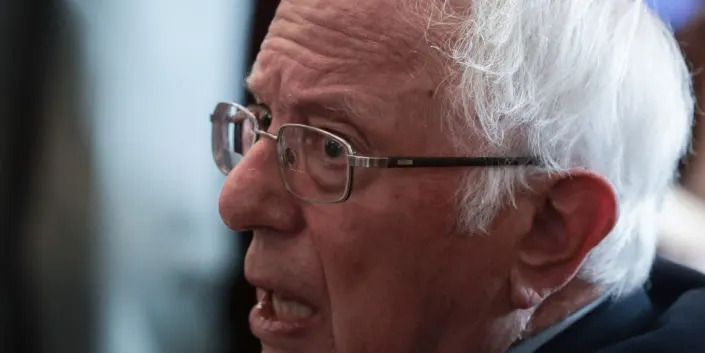John P. Moore
Fri, February 25, 2022

Dozens of anti-vax protesters rally in front of Los Angeles City Hall last September. (Genaro Molina / Los Angeles Times)
Conspiracy theorists' disinformation has led to the deaths of thousands of Americans every week by discouraging COVID-19 vaccinations. That toll will end up being a tiny fraction of the anti-vax movement’s body count.
Even when this pandemic is over, an energized base of anti-vaxxers will lead to more deaths for years to come. The uptake of standard childhood vaccines was already declining before COVID-19 hit, leaving more and more children vulnerable to diseases like diphtheria, measles, rubella, mumps, tetanus and whooping cough. Since the pandemic began, we’re also seeing more politics-driven attacks on state mandates for pre-school vaccination. Long-vanquished child-killing diseases will rise again, just because parents have been fooled into rejecting safe, long-proven vaccines.
The anti-vax movement has never been based on science. Its standard methods are similar to ones used by the charlatans who argued that HIV wasn’t the cause of AIDS, or that putting fluoride in the water is harmful. They claim that any opposition to their propaganda must be proof of “deep state” or “big pharma” corruption of science and public policy.
It’s a tired playbook, but it resonates with people whose psychological states leave them susceptible to believing conspiracy theories. One study found that people who believe “9/11 truther” theories are more likely than average to also believe COVID-19 vaccines are dangerous.
Robert F. Kennedy Jr., an influential anti-vaxxer, said at a recent rally in Washington: “Bill Gates and his 65,000 satellites alone will be able to look at every square inch of the planet, 24 hours a day.” And “They’re putting in 5G to harvest our data and control our behavior — digital currencies that will allow them to punish us from a distance and cut off our food supply.”
Why would anyone rational take medical advice from him — a lawyer who believes this kind of nonsense? But many do. It doesn’t help when people in positions of power buy in. Sen. Ron Johnson (R-Wis.) claimed that vaccinated athletes were “dropping dead on the field,” an outright fabrication.
Many anti-vaxxer leaders are glory-seekers and grifters. There’s serious money in play. One prominent anti-vaxxer, Joseph Mercola, has profited by peddling alternative remedies.
White supremacists and people with antisemitic views have found a home in the anti-vaccine movement, sometimes seemingly pitching their agenda to groups they hope to hurt. Somali immigrants have been deliberately targeted by anti-vaxxers, as have Black Americans, Orthodox Jews and other religious minorities. How many of the people who fall for anti-vax lies fully understand the various and often perverse agendas behind them?
The sensible majority of the American people need to fight back before this public health crisis rages further out of control.
Aggressive public service messaging could shock people into understanding not only the risk to adults who avoid COVID vaccination but also the full consequences of leaving children unvaccinated against deadly diseases like polio. Graphic antismoking TV ads can be a model. Deathbed testimonials from regretful victims of anti-vax propaganda send a powerful message. The many COVID-19 deaths of prominent anti-vaxxers should be widely publicized — to scare others from acting foolishly. Seeing death in all its horror can change minds.
And let’s get the courts involved. When words kill, there should be no absolute 1st Amendment protection. Grieving families of dead anti-vaxxers could sue the propagandists they listened to. There’s a model for this as well: Creative lawsuits have forced some white supremacist organizations out of business.
Since the pandemic began, the U.S. has seen public health professionals resign because of threats from anti-vaxxers, hollowing out infrastructure that’s critical to America’s welfare. We need more aggressive prosecutions of anyone threatening officials and scientists who promote vaccination. The public can help. Internet sleuths have identified hundreds of the Jan. 6 insurrectionists, feeding information to an FBI task force that makes arrests. Anti-vaxxers who threaten public servants are often anonymous — but may be traceable online.
Here’s another legal avenue: People who make money out of fake vaccination documents are active on social media. Their hubris should land them in prison.
Rather than letting infractions slide, state licensing boards and professional organizations should accelerate sanctions against physicians and pharmacists who distribute and profit from useless and harmful “COVID-19 drugs” such as ivermectin and hydroxychloroquine. It’s particularly egregious when they also refuse to prescribe FDA-approved drugs and trash vaccines that actually are effective against COVID-19. Affected patients and family members could sue the quacks who harmed them. We are now seeing “long COVID” sufferers targeted. Pushing untested cocktails of irrelevant drugs and supplements onto people with serious health problems is downright dangerous.
Taking on COVID-19 anti-vax malfeasance and malpractice is crucial and urgent. Successes on that front can help us counter the older and more pernicious resistance to childhood vaccinations. In the meantime, the flood of disinformation on social media continues to put our children’s futures at serious risk.
A successful scientist-led campaign against anti-vaxxer lies on Spotify has raised awareness of what needs to be done to stop the nonsense. Just as COVID-19 galvanized the anti-vax movement, it can also marshal widespread support to combat the propaganda and protect public health.
John P. Moore is a professor of microbiology and immunology at Weill Cornell Medical College.
This story originally appeared in Los Angeles Times.







